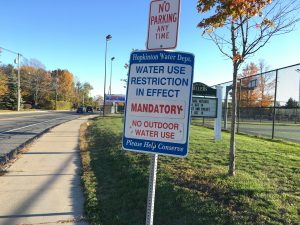What We Learned at the eHop Spotlight on Water

What We Learned about Public Water
- Approximately 70% of residents are on municipal water.
- Our municipal water supply comes from eight wells within Hopkinton. Depending on the water supply available in our eight wells versus our demand for water, Hopkinton also purchases water from Ashland that comes from two wells located on Wilson Street near Hopkinton State Park. Our access to these two wells is part of a 25 year agreement between Hopkinton and Ashland.
- Hopkinton has seven years left in our water agreement with Ashland. Hopkinton has a good relationship with Ashland that is mutually beneficial to the two towns.
- Ashland is considering connecting to the Massachusetts Water Resource Authority (MWRA) through Southborough which would reduce their reliance on their Wilson Street wells, thereby freeing up more of their well water for Hopkinton’s use.
- At Town Meeting 2016 residents voted to pay $1,000,000 to partner with the Town of Ashland to share their capital cost associated with their connection to the MWRA. We did this with the goal of helping to reduce Ashland’s reliance on their Wilson Street wells in order to free up that well water for Hopkinton.
- We will not be getting water directly from the MWRA through Ashland. Ashland has separate pipes for Hopkinton water. Our water supply from Ashland will continue to come from their two Wilson Street wells.
- Hopkinton has chosen the plan above because we do not have water lines near the Southborough border, which means the cost of our connecting directly to the MWRA is prohibitive and not an option at this point.
- Hopkinton’s $1,000,000 contribution to Ashland’s future connection to the MWRA is one piece of the financial puzzle needed to pay for their connection. The total cost of making the connection will be about $3-5 million, part of which will be paid by grants, part paid by Hopkinton’s $1M contribution, and the bulk paid by Ashland.
- The Town of Ashland will vote in November 2016 on whether to fund the bulk of the cost to connect to the MWRA. If they vote no, then Hopkinton will not provide the approved $1M to Ashland and we will not gain the benefit of increased water supply from Ashland’s Wilson Street wells.
- The MWRA gets water mainly from the Quabbin Reservoir in Western Massachusetts. The MWRA is a great clean water source, but it is expensive to get into. The state would have to approve any inter-basin connections.
- Two of Hopkinton’s wells, #4 and #5 on Spring Street, contain a lot of iron and manganese. These are not harmful minerals to our health, but they can cause water discoloration that will brown laundry. Hopkinton does not use these two wells except in times of drought. Hopkinton would like to filter wells #4 & #5 to remove the iron & manganese, but this would cost millions of dollars for a treatment plant and pipes.
- At Town Meeting 2016 residents voted to approve $50,000 for apilot program to test biological filtration of wells #4 & #5. If the program is successful, 828,000 gallons per day of water can become available reducing our need to purchase water from Ashland. However, the DPW’s priority right now is to increase our water supply by helping Ashland connect to the MRWA rather than filtering our backup wells through a new multi-million dollar treatment plant.
- If Ashland connects to MWRA, this would be an easier and less costly solution for Hopkinton. We wouldn’t have to go forward with the treatment plant for wells #4 and #5.
- In addition to the town’s eight municipal wells, there are nine other public water supplies in town (such as Carbone’s, Laborer’s Day Training, and Hopkinton Country Club Golf Course). They all have their own permits from MassDEP specifying the number of gallons they can use per day.
- Residents on the municipal water supply are subject to annual water restrictions and even stricter bans during times of drought. They are subject to fines for non-compliance with posted restrictions. First offense of non-compliance is a warning, second offense is a $100 fine, third offense is a $100 fine or termination of water supply.
- The town is challenged due to drought and growth, with new developments such as Hopkinton Mews.
- Town water use is permitted by MassDEP (Massachusetts Department of Environmental Protection) for all communities using surface or groundwater.
- The MassDEP looks at the big picture of water use for the whole state.
- Hopkinton is currently permitted by the MassDEP to withdraw 1.21 million gallons per day.
- MassDEP will likely ask us to decrease our gallons per day next time our permit is renewed. We have already applied for our renewed permit and are waiting to hear back from MassDEP.
- The town is constantly looking to fix leaks in Hopkinton’s public water system. The town used to have about 28% unaccounted for water loss, now it is down to about 15% unaccounted for water loss.
What We Learned about Private Water
- Approximately 30-35% of the community is on private water. For individuals on private water, it is their responsibility to provide safe water. They need to test their water quality regularly. They are not affected by the town water restrictions/bans, but are responsible for their own water conservation. If their private well runs dry they are responsible for digging a new well or providing their own water. Options include:
- Digging a deeper well
- Digging into a different water source
- Hydro-fracking to increase crack where water is coming from. Hydro-fracking can release contaminants.
- The Board of Health recently requested that 80 properties with private wells comply with the outdoor water ban, because they are close to our public water shed areas (within Zone #2).
- With private water supplies, it is very hard to know how your water use impacts neighbors. Neighbors are not always on the same aquifer, their wells may be different depths.
- Homeowners can have water storage tanks on site, so they have some water in reserve. Homeowners should research the original well at the time the house was built to make sure it is deep enough for long term usage needs of home. Demand for water per household has increased in recent years due in part of automatic sprinklers.
- The town doesn’t have the ability to ban watering from private wells or levy fines due to property owner rights under state law. However the town and citizens can raise awareness of the need to conserve without levying fines.
- Neighborhoods could potentially tap into town water in the future, depending on how far they are from the next public water supply pipes. This is not a realistic option for a neighborhood miles from the water supply, due to the expense.
- There are no subsidies that our speakers were aware of to help homeowners with the expense of digging a new well or obtaining clean water in the meantime.
- The Board of Health will work to grant well digging permits ASAP in the case of emergency.
- If a whole neighborhood is having water shortages, it was suggested that the neighbors come to the Board of Health together rather than one at a time.
- The town recommends (but cannot require) private well owners follow the outdoor water ban to get through the drought.
Other Facts & Information
Fire Safety
- The DPW Director assured us that despite the drought Hopkinton has enough water for fire emergencies.
Parks & Rec
- Parks & Recreation voted to stop watering the Town Common and the Athletics fields in September.
Drought History
- The State monitors all the reservoirs and streams.
- Massachusetts has had periods of drought throughout its history, but will sometimes go 20 years or more without a drought. Read more from the U.S. Geological Survey Water Supply Paper
- Hopkinton has had over two years of below average rain fall.
Water Conservation
- Water conservation kits are available at stores.
- Weston Nurseries & Angel’s Garden Center have information about drought tolerant planting.
- See eHop’s Spotlight on Water handout for water conservation tips.
New Developments
- The town has 20 year projections for estimated water use needs.
- All new buildings approved recently have been required to reclaim water from impervious surfaces, such as concrete, during permitting/planning process. This is in order to recharge the aquifer with storm-water. In the past, storm water was either sent in pipes to the ocean or sent to a detention pond.
- Attempts to curb growth in the past by not bringing public water supplies to all parts of town, were not successful. Developers and homeowners just built private wells and still built homes, which has resulted in more private water sources that cannot be regulated by the town.
- If the town accepts streets in new developments as public roads, then the town is responsible for storm-water recharge, otherwise the neighborhood association is responsible.

